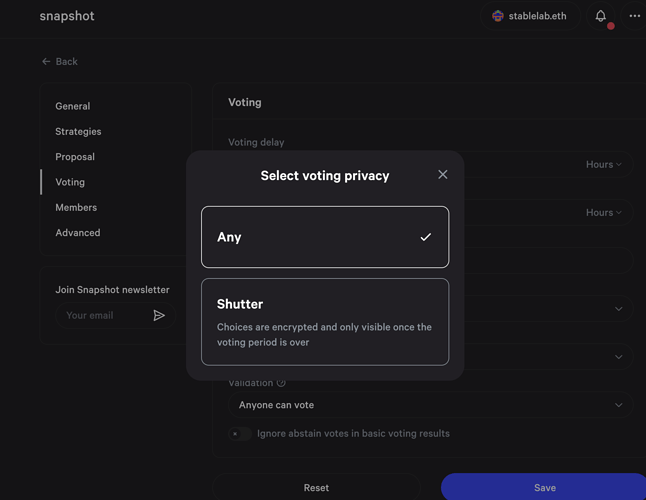RFC: Voting System Choice for Hop DAO Elections
Author: @Kene_StableLab, @Bobbay_StableLab
Simple Summary
As the Hop DAO opens itself up to more community involvement, it has become increasingly crucial for the DAOs elected positions to have a particular voting system through which nominees are elected into these positions.
Motivation
The Hop DAO community must take an active role in the day-to-day decision of the DAO, this is the motivation behind this proposal to decide on the voting system to be used in Hop DAO Elections.
Scope
At this time there are primarily two positions in the Hop DAO which this voting system will apply to.
- Community Multi-Sig Elections
- The Hop DAO Ambassador Program.
NB: This scope can be increased as the Hop DAO evolves over time.
Specification
- Voting options
- Our recommendation
- Poll
There are currently five voting system options available on Snapshot.
- Single Choice Voting: A user may only choose one option. These votes will be represented in the results as percentages of the total number of votes that each participant cast on the particular option. Great for picking one option from a variety of options. The primary disadvantage of this system is that voters can only choose one option.
- Weighted Voting: Each user can distribute their voting power across any number of options, from one to all. By increasing or reducing the voting power fraction, their voting power will be distributed among the options they have picked by the weight they give to each one. The major disadvantage of this system is it adds more complexity to the voting process.
- Approval Voting: Each choice selected (and approved) by a user has equal voting power; for example, if a user selects two options, both will receive the user’s entire voting power. This voting system allows for approval and does not allow voters to quantify their approval in percentages or varying degrees.
- Quadratic Voting: Each user can cast as many votes as desired. Due to the quadratically calculated outcomes, the number of individual voters matters more than the total amount of provided voting power. The power of the whales in this voting system is diluted in favour of smaller holders. The significance of individuals will outweigh the number of tokens. However, this voting type requires a Sybil-resistance method to stop whales from distributing governance power between several wallets.
- Ranked Choice Voting: Each user must order their rankings of the options. For each voter’s top pick, votes are tallied in the first phase. A choice wins if it earns more than 50% of the votes, which are cast on the users’ top selections. The outcome will display the percentages reflecting users only voted for their top option. This voting system particularly favours options with the most vital support; however, this voting system only produces one winner and is complex to understand and implement.
Our recommendation
We recommend weighted voting because, although it adds a bit of complexity to the process, voters can quantify their support in percentages for various candidates of their choosing. A voter could give 100% of their vote to a person or split their votes between four candidates by voting 25% each. Giving voters flexibility in deciding who is elected to specific positions would be a valuable approach to running our elections.
This voting system allows for the selection of multiple candidates, which is ideal for Hop DAOs elections.
Poll
From the voting system options above, which voting system would you prefer to be used for Hop DAO Elections?
- Single Choice Voting
- Weighted Voting
- Approval Voting
- Quadratic Voting
- Ranked Choice Voting
0 voters
Next Steps
Yes - Move this to snapshot to select a specific voting method
No - Continue to use single choice voting as the method for these elections
Abstain
Disclosure
Any of StableLab’s proposals, comments or electronic communications can not be used to create any legally binding contract or enforceable obligation in the absence of a fully signed written contract between StableLab and any third party.
This message may contain forward-looking statements about Hop DAO, its protocol, business plan, and strategy. These statements are based on current beliefs, assumptions, and information and are subject to risks and uncertainties that could cause actual results to differ. These statements reflect StableLab’s current views, but due to uncertainties in the future, persons are cautioned not to place undue reliance on statements made by StableLab.
